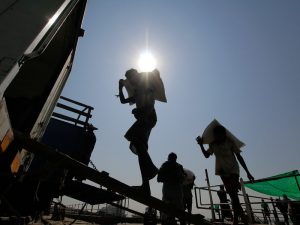Since a military coup upended Myanmar in February, most observers have recognized that the country’s political turbulence has been shadowed by a slower-moving but potentially catastrophic economic crisis.
The coup was followed by a wave of protests and work stoppages and the emergence of a Civil Disobedience Movement (CDM), which saw thousands of medical workers and other civil servants attempt to gum up the gears of the state administration. This hit an economy that was already stumbling due to the impact of lockdowns imposed to halt the COVID-19 pandemic, as well as the near-total collapse of sectors – like tourism – that relied on international mobility.
As protests swept the nation’s cities and towns, followed by violent crackdowns from the security forces, various institutions massively downgraded Myanmar’s economic outlook for 2021.
The projections are alarming. In April, Fitch Solutions, an affiliate of the global rating agency Fitch Ratings, revised its forecast for the financial year to September, published a briefing predicting that Myanmar’s economy would shrink by an astonishing 20 percent, from a pre-coup forecast of 2 percent growth. The World Bank has predicted that the Myanmar economy will shrink by around 10 percent.
A report from the International Labor Organization (ILO) now offers some sense of the impact that the coup has had on Myanmar’s workforce. According to an assessment released earlier this week, the U.N. labor agency found that Myanmar shed an estimated 1.2 million jobs in the second quarter of the year, reflecting “a continuous deterioration in labor market conditions since the military takeover.”
“Myanmar was already facing economic stress with jobs and livelihoods under threat as a result of the COVID-19 pandemic,” Donglin Li, the agency’s representative for Myanmar, said in a statement. “However, the estimates show a serious and rapid deterioration in employment in the first half of this year on a scale that could drive many in Myanmar into deep poverty.”
The ILO said that the political crisis precipitated by the coup has “exacerbated the severe impacts of COVID-19,” and “extensively destabilized the economy and halted an expected economic recovery.”
It estimated that employment contracted 6 percent in the second quarter of 2021, compared to the final quarter of last year, suggesting that more than 1.2 million workers had lost their jobs. The losses are greater when compared to the final quarter of 2019. On that timeframe, about 3.2 million people, or 15 percent of all workers, are no longer employed.
While the economy has been impacted across the board, some sectors have been especially hard hit. Employment in the construction sector has dropped by 35 percent and in the garment sector by 31 percent, while tourism and hospitality has seen a fall of 25 percent. According to the agency’s report. women were estimated to have been impacted more than men. The employment trends during the first half of 2021 indicated “considerable losses in both employment and working hours.”
Given that many of the jobs in these sectors, such as garment manufacturing, were poorly paid to begin with, it’s hard to see how things get better from here. The ILO’s estimates only stretch to the end of June, just as the current devastating COVID-19 wave began to rise in Myanmar, worsened in turn by the junta’s incompetence and cynical weaponization of the pandemic to strengthen its hold on power.
With COVID-19 out of control, and no end in sight for the stand-off between the military junta and those opposing it, Myanmar’s economy could be on the verge of a generational depression.

































